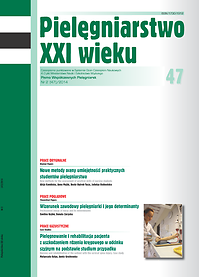Care standards of neonates born with Fetal Alcohol Syndrome (FAS) during hospitalization: project
DOI:
https://doi.org/10.12923/Keywords:
neonate, fetal alcohol syndrome, standards of nursing careAbstract
CARE STANDARDS OF NEONATES BORN WITH FETAL ALCOHOL SYNDROME (FAS) DURING HOSPITALIZATION: PROJECT
Introduction. Establishing norms for nursing care in the field of neonatal nursingis a very important issue of high-standard nursing care. Demand for higher and better quality of neonatal care as well as continuous improvement is bound with the need to systemize, update and establish standards of everyday nursing/obstetric care of neonates born with fetal alcohol syndrome (FAS).
Aim. The article aims at the presentation of a project of standards for nursing care of neonates born with FAS, based on the review of literature and current practice.
Conclusion. According to the standards proposed, a neonate born with FAS, either suspected or diagnosed, is to be provided with professional nursing care. Nursing process should account for any actual individual problems a neonate’s birth can pose. Midwife/nurse is to provide adequate care for such neonates, depending on neonate’s health condition and parents’ efficacy. It increases mother’s/father’s motivation to follow recommendations associated with the necessity of further treatment and followup.
References
1. Horecka-Lewitowicz A, Lewitowicz P, Adamczyk-Gruszka O. Objawy, przebieg i postępowanie w alkoholowym zespole płodowym. Stud. Med. 2013; 29(2): 195-198.
2. Kapka-Skrzypczak L, Niedźwiecka J, Skrzypczak M i wsp. Dieta ciężarnej a ryzyko wad wrodzonych dziecka. Med. Og. Nauki Zdr. 2011; 17(4): 218-223.
3. Szwedowska A, Antoszewska J, Kawala B. Wpływ alkoholu na powstawanie wad twarzoczaszki u płodu-przegląd piśmiennictwa. Pediatr. Pol. 2009; 84(1): 76-79.
4. Bhuvaneswar CG, Chang G, Epstein LA et al. Alcohol Use During Pregnancy: Prevalence and Impact. Prim. Care Companion J Clin. Psychiatry. 2007; 9 (6): 455-460.
5. Flynn H.A., Marcus S.M., Barry K.L. Rates and correlates of alcohol use among pregnant women in obstetrics clinics. Alcohol Clin. Exp. Res. 2003; 27(1): 81-7.
6. Sioda T. Wpływ alkoholu na prokreację i wczesny okres macierzyństwa. Pediatr. Pol. 2009; 84(4): 344-361.
7. Maloney E, Hutchinson D, Burns L, et al. Prevalence and Predictors of Alcohol Use in Pregnancy and Breastfeeding Among Australian Women. Birth 2011; 38(1): 3-9.
8. Wierzejska R, Jarosz M, Sawicki W i wsp. Antyzdrowotne zachowania kobiet ciężarnych. Tytoń, alkohol, kofeina. Żyw. Człow. Metab. 2011; 38 (2): 84-98.
9. Autti-Rämö I, Fagerlund A, Ervalahti N, et al. Fetal alcohol spectrum disorders in Finland: clinical delineation of 77 older children and adolescents. Am. J Med. Genet. 2007; 140A: 137-143.
10. Burd L, Deal E, Rios R, et al. Congenital heart defects and fetal alcohol spectrum disorders. Congenit Heart Dis. 2007; 2: 250–255.
11. et al. Fetal alcohol spectrum disorders in Finland: clinical delineation of 77 older children and adolescents. Am. J Med. Genet. A. 2010; 152A (11): 2731-2735.
12. Reinhardt K, Mohr A, Gärtner J, et al. Polymicrogyria in fetal alcohol syndrome. Birth Defects Res. A Clin. Mol. Teratol. 2010; 88(2): 128-31.
13. Kozubski W. Zaburzenia w obrębie układu nerwowego związane ze spożywaniem alkoholu. Przew. Lek. 2002; 5: 17-26.
14. Banach M. Alkoholowy zespół płodowy. Kraków: Wydawnictwo WAM, 2011.
15. Szczepański W, Szczepański M. Noworodek matki zakażonej HIV oraz uzależnionej. [w:] Pilewska-Kozak A. (red.). Opieka nad wcześniakiem. Warszawa: Wydawnictwo Lekarskie PZWL; 2009:260-275.
16. Piątek A. (red.). Standardy opieki pielęgniarskiej w praktyce. Warszawa: Przewodnik metodyczny. Naczelna Rada Pielęgniarek i Położnych, 1999.
Downloads
Published
Issue
Section
License
Copyright (c) 2014 Klaudia Pałucka, Justyna Pakuła, Celina Łepecka-Klusek, Anna B. Pilewska-Kozak, Agnieszka Bałanda-Bałdyga (Autor)

This work is licensed under a Creative Commons Attribution 4.0 International License.




